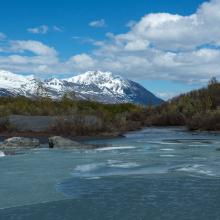alaska
In the United States, many church congregations face tough decisions about their future—and, to an extent, the future of the planet. Demographic changes over decades have led to many congregations becoming older and smaller than they once were. In many cases, that can leave a handful of people taking care of a large, older building in need of often expensive upkeep and repairs.
I don’t often turn on a non-news network television show and expect to learn. Instead, I expect to laugh, maybe cry (I’m looking at you, This Is Us), see loads of inaccurate depictions of medical interventions, or simply be entertained. But ABC’s new primetime drama Alaska Daily has me expanding my perspective on the possibilities of network TV. And that’s thanks to the light it’s bringing to a dark truth: the crisis of missing and murdered Indigenous women.
O God of all creation, as ocean waters warm, / we grieve the devastation that comes with violent storms. / We pray for people struggling— who need your help and grace / on every flooded island and in each flooded place.

Photo via FloridaStock / Shutterstock.com
After over one hundred years of being known as “Mount McKinley,” North America’s tallest mountain will henceforth be officially recognized as “Denali.” President Obama announced the change on Aug. 30 in anticipation of his trip to Alaska, on which he will call for aggressive action against climate change.
Alaskan Native tribes have long objected to the cultural imperialism embedded in the name “Mount McKinley,” which commemorates a man who never even stepped foot in Alaska.
Recently President Obama proposed giving wilderness status to 12 million acres of the Artic National Wildlife Refuge.
Many Republican senators, including Alaska Sen. Lisa Murkowski, strongly oppose the president’s proposal. Much of the opposition is expressed as frustration and outrage that the president is hindering Alaskans from having control over their economic future. Sen. Murkowski asserts:
What’s coming is a stunning attack on our sovereignty and our ability to develop a strong economy that allows us, our children and our grandchildren to thrive. … It’s clear this administration does not care about us, and sees us as nothing but a territory. … I cannot understand why this administration is willing to negotiate with Iran, but not Alaska. But we will not be run over like this. We will fight back with every resource at our disposal.
The ANWR is home to significant untapped petroleum reserves that lie beneath the land the president is seeking to protect. This fight between protecting the ANWR and promoting economic growth and development through oil drilling is one that has been going on between Democrats and Republicans for years.
Alaska Gov. Bill Walker said in a statement he may be forced to accelerate oil and gas permitting on state lands to compensate for the new federal restrictions.
While I believe I understand the arguments made by advocates on both sides, it seems to me there is a fundamental ideological (and possibly theological) premise that often goes unacknowledged in these debates.
The Supreme Court’s decision to sit out the legal battle over same-sex marriage will — for now, at least — leave the future of laws prohibiting gays and lesbians from marrying in the hands of lower state and federal court judges. But it also almost certainly means the couples challenging those laws are more likely to win in the end.
The court said Oct. 6 that it would not hear appeals from five states whose same-sex marriage bans had been invalidated by lower federal courts. The decision, issued without explanation, will likely lead to recognition of gay marriages in 11 more states. It also allows an avalanche of legal challenges to the remaining bans to keep going forward in state and federal courts, where gay and lesbian couples have overwhelmingly prevailed.
The court’s decision leaves unchanged 20 state laws blocking same-sex unions. Each is already under legal attack, facing challenges in state or federal court, and sometimes both. Challenges to marriage bans already have reached a handful of state appeals courts and the federal appeals courts for the 5th, 6th, 9th and 11th circuits.
Some of those judges had been waiting to see what the Supreme Court would do. The court’s instruction Oct 6. was: Proceed.
The residents of Newtok, Alaska could see their village washed away within five years, making them the first American climate refugees. Newtok is surrounded by the Ninglick River, which continues to carry off 100ft or more of land each year. The highest point in the village could be underwater by 2017. The small community of 350 will be scattered across Alaska, with Newtok ceasing to exist. The Guardian reports:
"The snow comes in a different timing now. The snow disappears way late. That is making the geese come at the wrong time. Now they are starting to lay their eggs when there is still snow and ice and we can't go and pick them," Tom said. "It's changing a lot. It's real, global warming, it's real."
Read more here.




